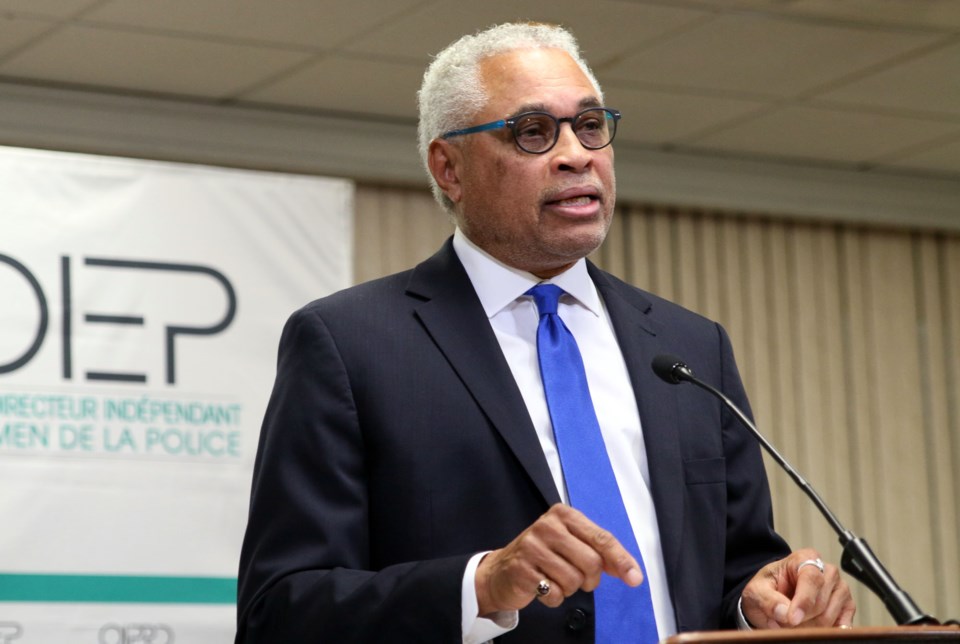THUNDER BAY - Three years after the Office of the Independent Police Review Director Gerry McNeilly handed down 44 recommendations to the Thunder Bay Police Service to address issues of systemic racism at an institutional level, the Police Service is on track to complete 80 per cent of those recommendations by spring 2022.
The third annual progress report on the OIPRD recommendations was presented to the Thunder Bay Police Services Board on Tuesday.
Of the 44 recommendations, 28 are now considered complete, while 12 remain ongoing, and four are listed as not applicable to the Thunder Bay Police Service.
McNeilly released his report, Broken Trust: Indigenous people and the Thunder Bay Police Service, in December 2018. The report concluded there was systemic racism at an institutional level in the Thunder Bay Police Service, as well as inadequate investigations relating to sudden death cases involving Indigenous people in the city of Thunder Bay.
The recommendations included calls for the Police Service to undertake significant changes, such as expanding the Criminal Investigation Branch, enhance information sharing with other regional police services, increase the number of officers in the Aboriginal Liaison unit, now the Community Inclusion Team, implement in-car and body-worn cameras for frontline officers, proposed changes to the service’s relationship with the Coroner’s Office, implementing cultural competency training, creating more diversity within the service, and improve its investigation file management system.
The report also called for the reinvestigation into nine sudden deaths involving Indigenous people in the city of Thunder Bay due to the initial investigations conducted by the Thunder Bay Police Service being called problematic, deficient, and inadequate.
The nine cases include Christine Gliddy, Shania Bob, Marie Spence, Aaron Loon, Sarah Moonias, as well as four cases involved in the Seven Youth Inquest – Jethro Anderson, Curran Strang, Kyle Morrisseau, and Jordan Wabasse.
The terms of reference for the reinvestigations were finalized in September 2019 and the blended investigative team worked at gathering and reviewing reports from the Ontario Provincial Police, the Thunder Bay Police Service, and the Office of the Chief Coroner involving the nine deaths over the past two years, as well as meeting with families and witnesses.
The final report into the reinvestigations has been delayed several times due to the investigation process and the COVID-19 pandemic, but it is now anticipated to be presented in spring 2022.
A t10th reinvestigation relating to the 2015 death of Stacey DeBungee has since been taken over by the Ontario Provincial Police.
According to Thunder Bay Police Service chief Sylvie Hauth, once the final report into the reinvestigations is presented and the Police Service moves to the a new OPTIC Records Management System in April 2022, the majority of the recommendations will be complete.
“There’s a lot of information there and a lot of great work that has been done over the last three years,” she said.
“We had 44 recommendations when the process started at the end of 2018. When you put it in numbers, once the final report is done for the reinvestigation process and we’ve migrated to OPTIC, we will have completed 80 per cent of the recommendations.”
Other recommendations now considered complete include the in-car and body-worn camera project, with 136 body-worn cameras deployed to frontline officers and 30 in-car cameras installed in police vehicles.
The Criminal Investigations Branch has also been expanded and now includes four detectives, 16 detective constables assigned to major case management, and 20 dedicated officers.
The Aboriginal Liason Unit is now the Community Inclusion Team and is staffed by two Indigenous Liaison officers and a civilian coordinator.
Another recommendation included reviewing policies relating to missing person cases and the Police Service is now utilizing the Missing Persons Act and its missing person policy underwent another internal review in 2021 and will again in 2022.
Recommendations that are still considered ongoing involve issues relating to culturally appropriate training, which is continuing and includes the Gawendum Gakina Awaya Reconciliation Training that began last year.
Other ongoing recommendations relate to public reporting, a human resources plan to ensure the Criminal Investigation Branch and Major Crimes Unit is never without experienced investigators, enhancing information sharing with other police services in the region, and engaging with Indigenous groups on reconciliation efforts.
The recommendations listed as not applicable to the Thunder Bay Police Service deal primarily with the Coroner’s Office such as locating a forensic pathology unit in the city of Thunder Bay to assist all police services within the Northwest region.
Currently, the majority of post-mortem examinations take place in Toronto.
“It is something that could greatly benefit the region,” Hauth said. “It is a drain of resources for all communities.”
Police Services Board member Michael Power noted that while this represents an annual report on the OIPRD recommendations, it is a standing agenda item and the board receives updates on a monthly basis.
“The board and the service take this very seriously,” he said. “I commend the thousands of hours invested in moving this forward.”
The Police Services Board also received a brief presentation from the Inspector General of Policing, Ken Weatherill.
The Inspectorate is a police oversight body operating at arm’s length from the Ministry of the Solicitor General. It was implemented as part of the Community Safety and Policing Act of 2019, which is awaiting proclamation.
When the Community Safety and Policing Act comes into effect, the Inspectorate will take over all policing complaints with the Ontario Civilian Police Commission being phased out.
